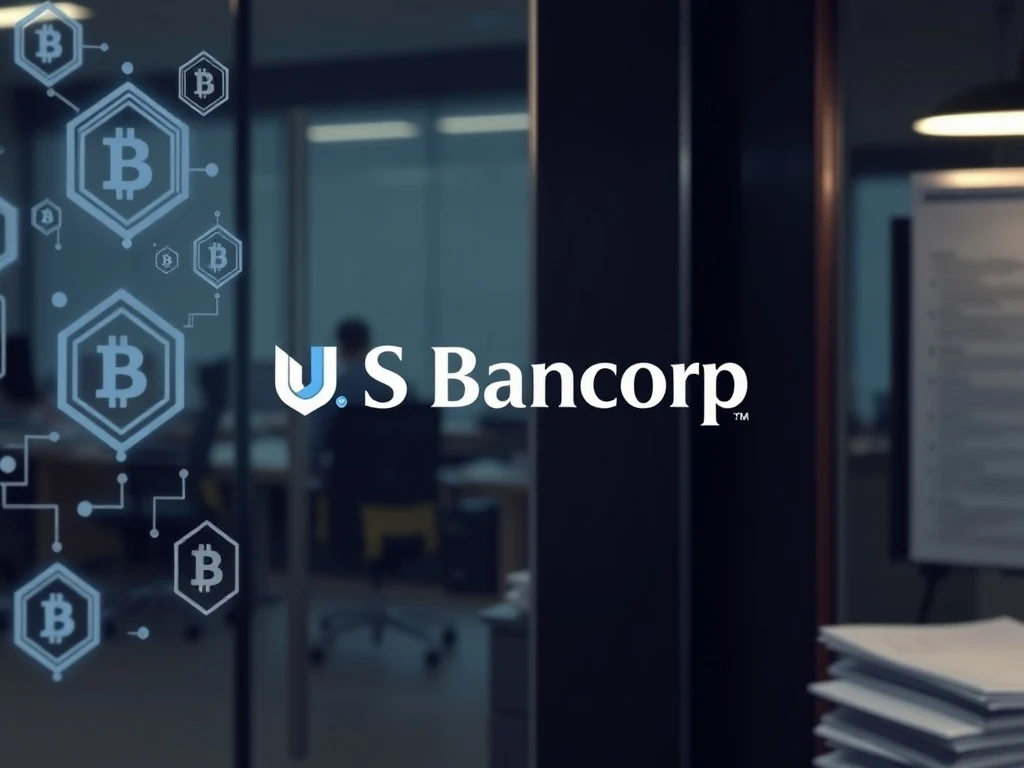Crypto Custody: US Bancorp’s Strategic Re-entry Expands Digital Asset Services

The financial world watches closely as US Bancorp, America’s fifth-largest commercial bank, makes a significant return to the digital asset space. Its renewed commitment to crypto custody services for institutional clients marks a pivotal moment. This strategic move, following a crucial regulatory shift, signals growing mainstream acceptance for institutional crypto investments and expands critical digital asset services.
US Bancorp Crypto Reboots Digital Asset Services
US Bancorp has officially relaunched its crypto custody services. This re-entry specifically targets institutional investment managers. The bank had initially paused these operations due to earlier regulatory guidance. Now, however, a regulatory shift under the Trump administration has cleared the path. This change rolled back a previous SEC rule. That rule had required banks to hold significant capital on their balance sheets for crypto-related activities. Consequently, this eased the burden on traditional financial institutions.
Stephen Philipson, head of US Bank’s institutional division, expressed confidence in this renewed push. He stated, “We had the playbook and it’s sort of opening it up and executing it again.” The bank plans to scale these services as demand increases. Furthermore, it explores integrating digital assets into other areas. These include wealth management and consumer payments. This broader vision highlights US Bancorp’s long-term commitment to the evolving digital economy.
Understanding the Regulatory Shift and SEC Crypto Regulation
The regulatory environment plays a critical role in how traditional banks engage with cryptocurrencies. The initial SEC guidance, which prompted US Bancorp to pause its services, created a cautious atmosphere. It mandated stringent capital requirements for crypto holdings. This effectively made offering such services less appealing for banks.
However, the subsequent rollback of this specific SEC Crypto Regulation under the Trump administration provided much-needed clarity and flexibility. This adjustment allowed banks to reassess their involvement in the digital asset sector. It effectively reduced the capital burden associated with crypto-related activities. Moreover, evolving federal guidance, particularly from the Office of the Comptroller of the Currency (OCC), further empowers banks. These changes provide them with more operational freedom in the digital asset space. This regulatory evolution is crucial for fostering wider adoption.
Expanding Digital Asset Services for Institutional Clients
Initially, US Bancorp Crypto will focus on providing custody services for Bitcoin (BTC). These services will cater to registered investment funds and Bitcoin ETF providers. This strategic starting point targets the most established digital asset. Bitcoin’s widespread acceptance makes it an ideal entry point for institutional clients seeking secure storage solutions. Eventually, the bank may expand its offerings to include other cryptocurrencies. However, these assets must meet its strict internal risk and compliance standards. This cautious approach underscores the bank’s commitment to security and regulatory adherence.
The demand for secure digital asset services from institutions continues to grow. These clients require robust solutions for managing their crypto holdings. Key benefits of institutional crypto custody include:
- Enhanced Security: Protection against hacks and theft through specialized infrastructure.
- Regulatory Compliance: Adherence to financial regulations and reporting standards.
- Operational Efficiency: Streamlined processes for managing large-scale digital asset portfolios.
- Risk Mitigation: Professional management of private keys and access protocols.
These advantages are essential for attracting and retaining institutional investors. They seek reliable and compliant partners in the crypto market.
The Competitive Landscape of Crypto Custody
The crypto custody service space has traditionally seen leadership from crypto-native firms. Companies like Coinbase, BitGo, and Anchorage Digital established early dominance. They built specialized infrastructure and expertise in managing digital assets. Nevertheless, the entry of traditional financial powerhouses significantly alters this landscape. These established banks bring unparalleled trust, extensive client networks, and deep regulatory experience.
US Bancorp is not alone in this renewed push. BNY Mellon, America’s oldest bank, launched its digital custody platform in 2022. It safeguards select institutional clients’ Bitcoin and Ether (ETH) holdings. This move made BNY Mellon an early pioneer among large US banks. Globally, other major institutions are also making strides:
- Deutsche Bank: Germany’s largest bank plans to offer cryptocurrency storage to clients. It aims to launch a digital assets custody service by 2026. This initiative involves a collaboration with Bitpanda crypto exchange’s technology unit.
- Citigroup: Reports suggest Citigroup is exploring cryptocurrency custody and payment services. It aims to capitalize on a market bolstered by favorable regulatory approvals.
These developments indicate a clear trend. More traditional financial institutions recognize the long-term potential of digital assets. They are actively integrating crypto services into their core offerings. This competition benefits institutional clients. It provides them with more choices for secure and regulated custody solutions.
Institutional Crypto Adoption and Future Prospects
The re-entry of US Bancorp Crypto into the digital asset custody market underscores a broader trend. Institutional adoption of cryptocurrencies is accelerating. Banks are increasingly viewing digital assets as a legitimate asset class. This shift is driven by growing client demand and evolving regulatory clarity. Secure custody solutions are fundamental for this institutional embrace. They provide the necessary trust and infrastructure.
Furthermore, the bank’s exploration into wealth management and consumer payments signifies future expansion. Integrating digital assets into these areas could revolutionize how individuals and businesses interact with their finances. Imagine seamless crypto transactions or digital asset portfolios managed alongside traditional investments. Such advancements could make cryptocurrencies more accessible and practical for everyday use. This potential growth will depend heavily on robust regulatory frameworks and continued technological innovation. The journey towards widespread adoption is complex, yet promising.
The strategic re-entry of US Bancorp into crypto custody services represents a significant milestone. It not only revitalizes the bank’s own digital asset services but also strengthens the overall legitimacy of institutional crypto. As regulatory landscapes continue to evolve, traditional financial institutions will play an increasingly vital role in securing and integrating digital assets into the global financial system. This development signals a robust future for cryptocurrencies within mainstream finance.








